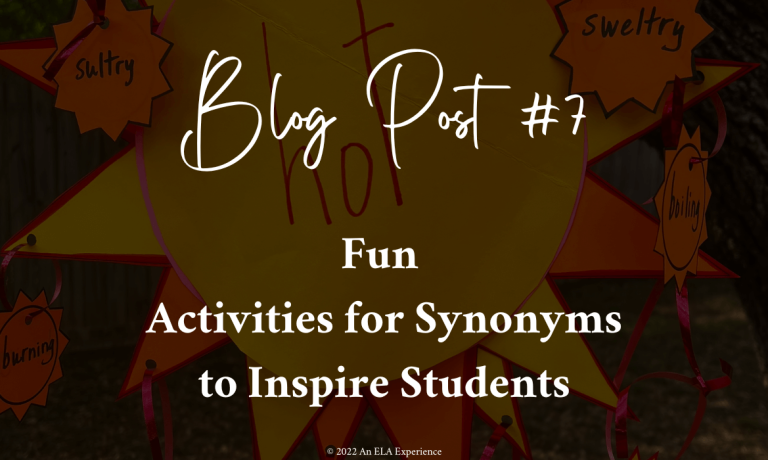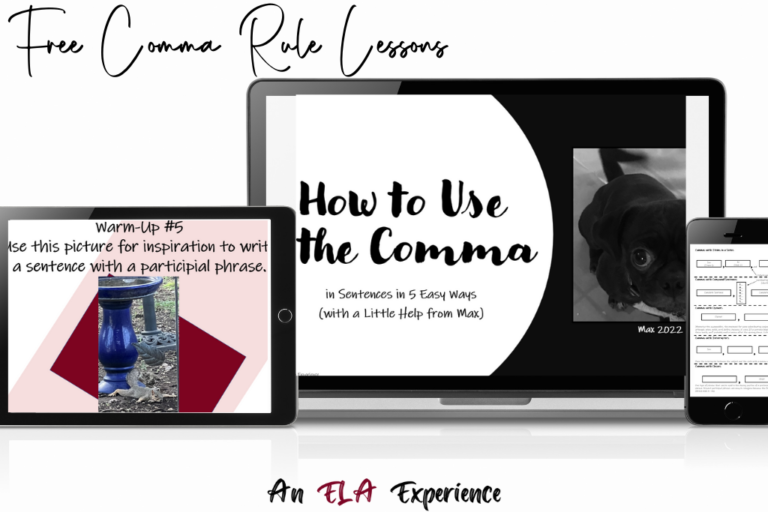When revising for word choice, you can direct students to use thesauri to replace overused words, or you can use some activities for synonyms to hook and teach them. I guarantee the second way works better. (I can’t say I knew this at the beginning of my teaching career, but I do now.)
Students need instruction on how to use a thesaurus and even what type of words to look for. Plus, probably now more than ever, they need to improve their vocabularies. Synonyms can address this need, while also allowing students to find more precise words.
Activities for Synonyms #1–Synonym Mobile or Poster
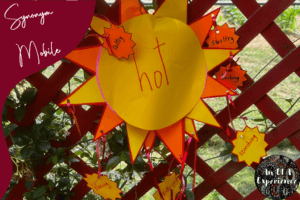
The synonym mobile is one of the hooks for these lessons. If you want to scan your classroom and see every single student on task and engaged, then begin with a synonym mobile or poster. I’ve used both and sometimes given them a choice between the two. Either way, students like this activity.
Before Class
Gather your supplies:
- Glue
- Markers
- Construction paper
- Yarn or ribbon
- Thesaurus (digital or text)
- Wire hangers (for the mobile) (If you’ve ditched the hangers, then start asking friends and family to search their closets.)
During Class
Before the students begin constructing their mobiles or posters, you’ll need to provide some instructions.
First, review directions with a rubric. As I’ve mentioned in a previous post, students perform better when they know what is expected. This rubric tells them exactly what to do to score an A on this assignment. Also, since I added “satisfactorily complete the assignment,” I can deduct points if needed (so that it is an assessment, not simply a completion grade).
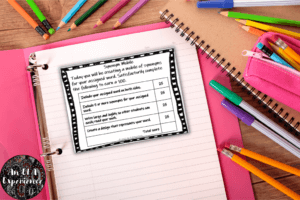
Let them know that they will work in small groups (with three to four students). Each group will be assigned one overused word, and they will need to find at least five synonyms for that word. They should write large and legibly so others can read their work, and their designs should represent their assigned word.
Next, show them an example of what they’ll be creating, noting how it meets the criteria stated in the rubric. (Use the image below for your first period. Once they have completed the activity, you’ll have plenty of examples to share with your other classes.)
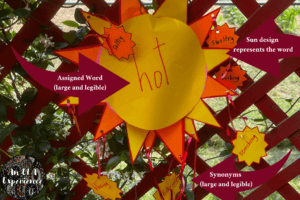
Finally, they will need a quick demonstration on how to use a thesaurus.
If your students have electronic devices, then visit dictionary.com’s thesaurus. Show them how it’s super easy to find synonyms with the closest matches highlighted in red, and how the tabs at the top help users find the correct synonym.
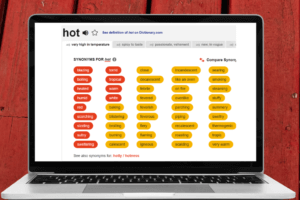
If your students are using books, then model how to use the guide words at the top of pages to locate the words they’re looking for and explain how the abbreviations for the parts of speech will come in handy.
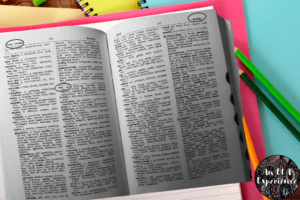
Now, put your students into groups of three or four, assign them an overused or elementary-level word (as seen from the sample list below), show them where they can find their supplies, and let them get started. You’ll also find it helpful to set a timer and to have each group select a person to get supplies so you don’t have a crowd at your supply table.)
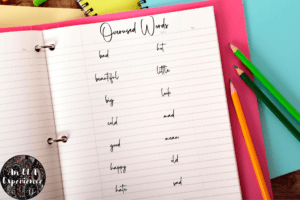
When students finish, you can close the lesson by having them present their words and synonyms to the class while you score their mobiles.
Activities for Synonyms #2–Mini Thesaurus
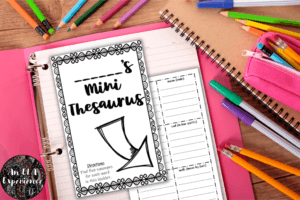
Move on to a mini thesaurus. Students can make one with a sheet of paper by folding it in half (hamburger style), designing a front cover, and drawing boxes for words on the inside and back pages.
Rather than use this as a worksheet, increase engagement by making it a gallery walk. Students can work in small groups to view the mobiles or posters and write synonyms in their thesauri for the noted words. When they’re finished, they can tape these into the toolbox section of their writers’ notebooks for easy reference. (For this to work, make sure to use the same words for the thesaurus as you did for the mobiles or posters.)
Activities for Synonyms #3–Greater Than or Less Than Worksheet
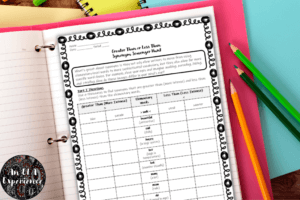
A thesaurus allows writers to be more precise (like Jonas in The Giver when he decided he was apprehensive rather than frightened). Synonyms offer meanings and connotations that are less than or greater than the word being used. Take the word happy for example. You can be elated (really happy) or you can be content (happy, but not jumping with excitement).
To help students understand this, I created “Greater Than or Less Than,” a worksheet where students use a thesaurus to look up words and decide whether the word is more or less intense than the noted word. You can do this too. Have students write overused words across their papers vertically and write a greater than sign on one side and a less than sign on the other, and they’re ready to go!
Activities for Synonyms #4–Exit Slips
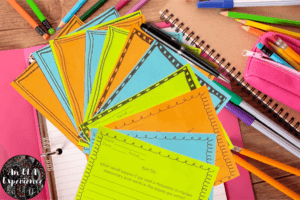
Lessons need closure too, and exit slips offer an excellent way to do this. Not only do they allow for a quick close, but they also provide an opening for the next day, an opening that provides a review of a previous lesson and a moment to clear up misconceptions.
Just give each student an index card, and ask them to answer a question.
- What was the main idea of today’s lesson?
- What is the best way to find a synonym for a word? Explain.
- What would happen if you used a thesaurus to replace elementary or overused words in the essays you write?
Activities for Synonyms #5–Apply to Writing
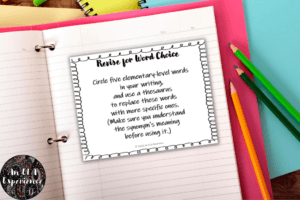
As I mentioned, before students search their drafts for overused or elementary-level words, instruction is necessary. However, they also need to apply this learning to their writing; they need to use what they’ve learned.
To do this, have students read their drafts and circle one or all of the following:
- Elementary-level words you covered in the lessons,
- elementary-level words they notice in their drafts, and/or
- words they used too often in their drafts.
They can then use their thesauruses to replace them with better, more precise words.
I like to remind students to make sure they understand the synonym’s meaning before using it so that they don’t use a word incorrectly.
Activities for Synonyms #6–Synonym Bingo
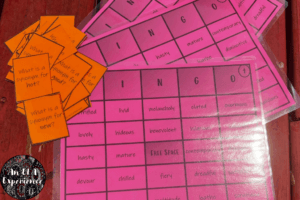
Here’s another hook! Sometimes we need to have a little fun, and bingo is a game for synonyms that I’ve used that the kids like.
Print and make copies of a blank bingo card. (Canva has templates.) Write your elementary-level words on slips of paper, and have students write the words’ synonyms on their bingo cards. You’ll draw words, and students will mark the synonyms on their cards. When they mark five words across in any order (up, down, across, or diagonal), they yell, “Bingo!” (You can also play four corners or blackout.) Have students mark their cards with different colors of ink so that you can play more than one game, and don’t use beans as markers (unless you enjoy cleaning).
Related Links
Activities for Synonyms at my TPT store (to purchase the resources discussed)
Teaching Synonyms in the Classroom | The Must-Have Synonym Poster Collection | Teach Starter (elementary)
Teaching Students to Edit a Little Every Day (Blog #9)
Thank YOU for reading!
Since I first started teaching, back in the late 1900s, I’ve loved the staff development days where I learned strategies to use with students that would both teach and engage. Several years in, thanks to an amazing district-level leader, I started reading educational books in this area. I especially liked the ones that gave me great ideas without making me read a novel. (Don’t get me wrong; I am a reader. I just prefer shorter texts during the school year because of time.) Today, we can get this on the internet–ideas that teach and engage written in just a few pages. That’s what I want to give you, and I do hope you enjoy reading this as much as I liked writing it!
Leave a comment and let me know what activities for synonyms you try with your kids!

